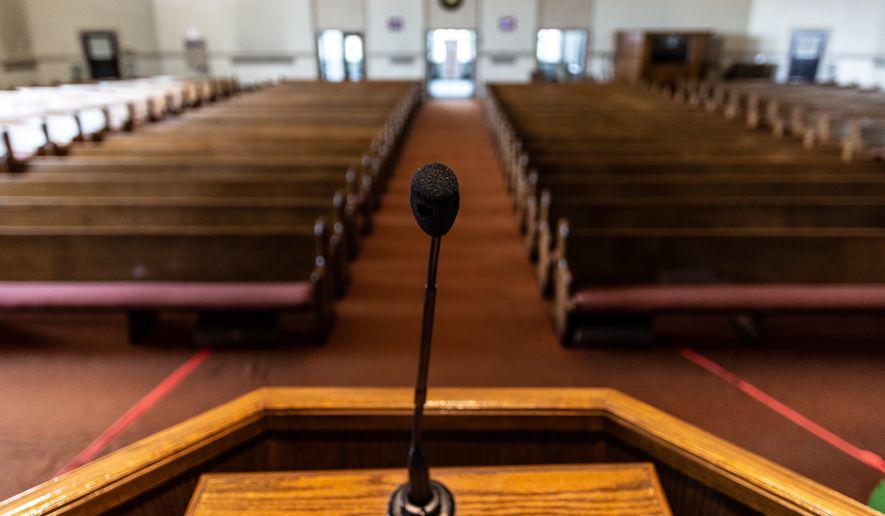The FBI’s probe into whether traditional Catholics posed a terrorist threat included interviews with a priest and a church choir director and involved an undercover agent who infiltrated the church, House investigators said Monday.
A House panel examining the weaponization of government uncovered the interviews and the role of at least one undercover agent as part of a congressional probe into the FBI’s recent targeting of traditional Catholics.
Subpoenas issued in the investigation, House lawmakers said, revealed that the FBI “singled out Americans who are pro-life, pro-family, and support the biological basis for sex and gender distinction as potential terrorists.”
According to the House Judiciary subcommittee on the weaponization of government, the FBI’s interviews with a priest and choir director were used to inform on a parishioner under investigation who self-described as a “radical traditionalist Catholic.”
FBI employees in the bureau’s Richmond, Virginia, office where the probe originated could not define the meaning of radical traditionalist Catholic, but “this single investigation became the basis for an FBI-wide memorandum warning about the dangers of ‘radical’ Catholics,” House lawmakers said Monday.
The FBI probe was not limited to Richmond. House investigators said it relied on “reporting from other field offices,” including Los Angeles, Milwaukee and Portland, Oregon.
The House launched its investigation of the FBI’s targeting of traditional Catholics after a leaked document from the Richmond field office was posted earlier this year on the website UncoverDC.
It warned that Catholics who favored the traditional Latin Mass are more likely to be interested in joining violent extremist groups.
The FBI proposed developing “sources among the Catholic clergy and church leadership” to aid in its investigation, according to the subcommittee report released Monday.
FBI relied on at least one undercover agent to develop its assessment of traditional Catholics, and the FBI proposed developing sources among the Catholic clergy and church leadership.
The interviews with the priest and choir director were used to draft the memo, which warned that “radical-traditionalist Catholics” adhere to an “anti-Semitic, anti-immigrant, anti-LGBTQ and white supremacist ideology [and are prone to] extremist ideological beliefs and violent rhetoric.”
Bureau leadership revoked the memo after it became public. FBI Director Christopher A. Wray stopped the Richmond field office’s investigation and distanced himself from any involvement.
In a statement to The Washington Times on Monday, the FBI said: “We have stated repeatedly that the intelligence product prepared by one FBI field office did not meet the exacting standards of the FBI and was quickly removed from FBI systems.
“An internal review conducted by the FBI found no malicious intent to target Catholics or members of any other religious faith, and did not identify any investigative steps taken as a result of the product.
“The FBI is committed to upholding the constitutional rights of all Americans and we do not conduct investigations based solely on First Amendment-protected activity, including religious practices. The FBI investigates violence, threats of violence, and violations of federal law. We have provided hundreds of pages of documents and briefings to the Committee to address our findings and the numerous actions we are taking to address identified shortcomings.”
The FBI memo associating traditional Catholics with terrorism was authored by two unidentified FBI employees who based much of it on reporting from the Southern Poverty Law Center and the publications Salon and The Atlantic.
The SPLC is known for identifying conservative, pro-life and parental rights organizations as hate groups. In 2021, it listed nine Catholic groups as “radical traditional Catholic hate groups.”
In April, the House Judiciary Committee revealed plans by the Richmond field office to spy on Catholic churches and church leaders. They distributed their plan to other FBI offices across the country.
According to an FBI internal document, the bureau relied on information from at least one undercover operative who sought to use local religious organizations as “new avenues for tripwire and source development.”
The documents detail how the FBI planned to develop sources in Catholic churches. Two senior intelligence analysts and the chief counsel for the Richmond office approved their probe.
• Susan Ferrechio can be reached at sferrechio@washingtontimes.com.




Please read our comment policy before commenting.